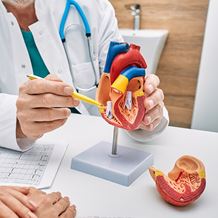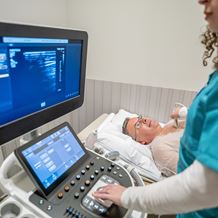
- Home
- Services
- Cardiac Services
- Conditions
- Takotsubo Cardiomyopathy "Broken Heart Syndrome"
What is takotsubo cardiomyopathy?
Takotsubo cardiomyopathy, also known as ‘broken heart syndrome’ or stress cardiomyopathy, is a heart condition that is brought about by extreme emotional or physical stress. The left part of the heart temporarily changes shape (representing the takotsubo, a Japanese octopus trap) and is unable to effectively pump blood around the body. Triggers are thought to include the death of a loved one, divorce, job loss, intense fear or anger, or sudden physical stress. This heart condition can affect anyone at any age, but mostly affects older women aged 58-77, or those who have previously suffered from a psychiatric or neurological disorder. The most common type of takotsubo cardiomyopathy affects the lower half of the heart. In some cases, it can affect the middle section and in very rare cases, it can affect the higher section or even cause part of the heart to bulge out.
Symptoms and causes
Takotsubo cardiomyopathy symptoms closely resemble those of a heart attack – shortness of breath, chest pain, palpitations, fainting and stroke-like symptoms such as confusion or numbness. They can be experienced within minutes or even some hours after a stressful event. Where broken heart syndrome differs to a heart attack is that there are no underlying indications of heart disease, and patients usually make a full recovery. The cause is not fully understood but it is thought to be associated with certain hormones that are naturally released on encountering stress.
How is it diagnosed?
Takotsubo cardiomyopathy is diagnosed in the same way as any other heart condition and your doctor will perform several tests in order to rule out a heart attack or underlying heart condition. In order to study the shape and behaviour of your heart and arteries and check for different heart conditions, testing may include:
Patients suffering from takotsubo cardiomyopathy will not have any blockage in their arteries.
How is it treated?
Although there is no cure for broken heart syndrome, there is medication available to help with the symptoms and most patients will feel the benefit almost immediately and go on to make a full recovery. Certain heart medication such as beta blockers may be recommended to reduce the stress on your heart, as well as blood thinning medication to reduce the risk of clotting. The heart muscle usually heals within 2-4 weeks. Talk to your doctor about managing physical and emotional stress in the future.

Other conditions
What's next?
If you have been experiencing heart-related symptoms, book an appointment with our cardiac services specialist today.
Our specialists in Cardiac Services
View all specialists




